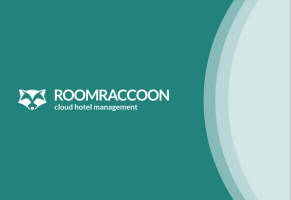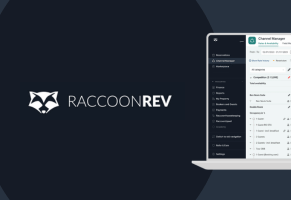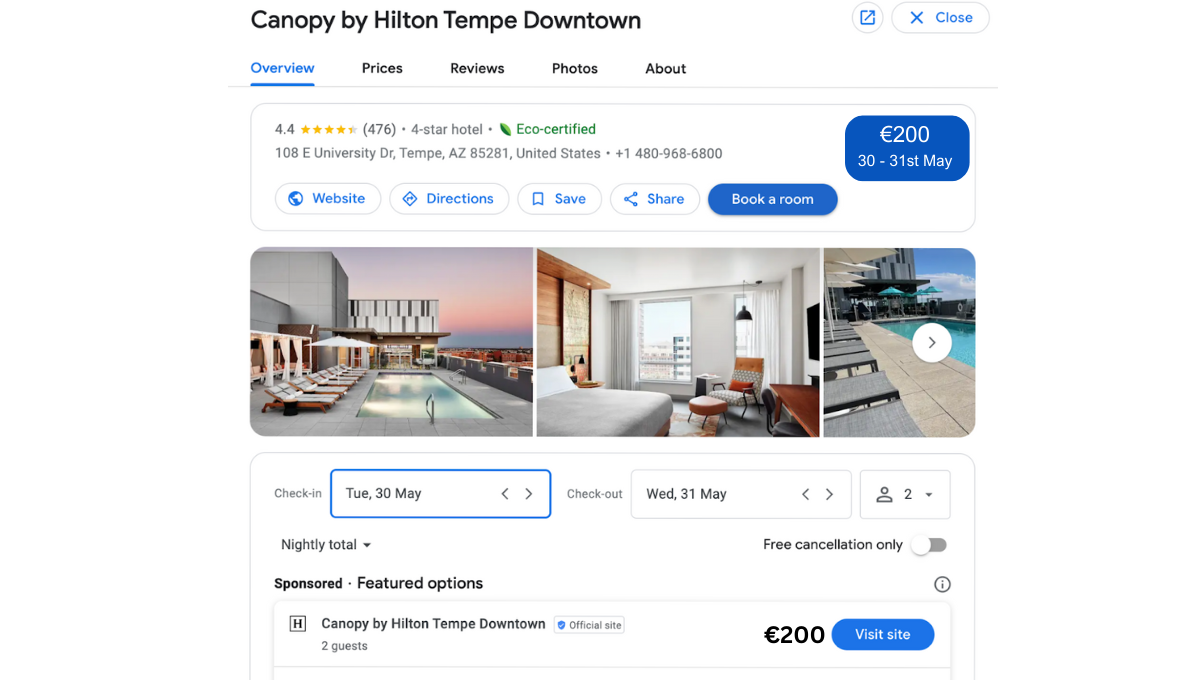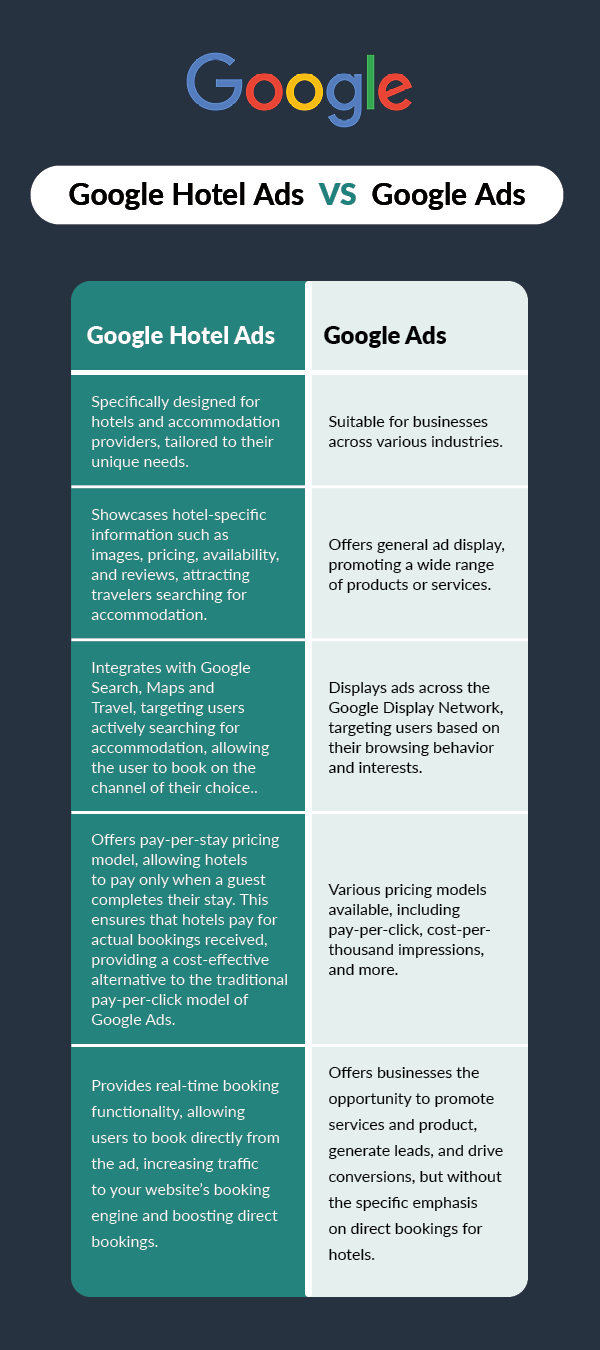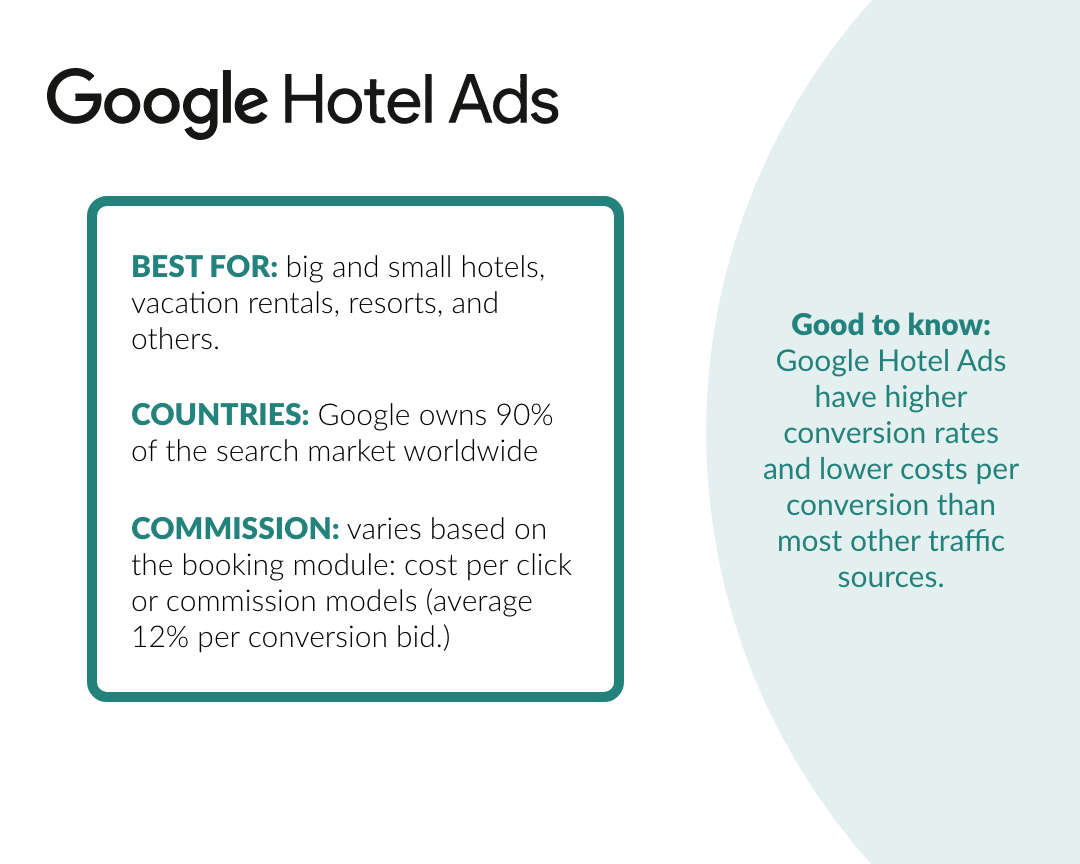CORE PRODUCT
Google Ads for Hotels: A Comprehensive Guide
May 31, 2023 Justine. S
Share this post

Welcome to our comprehensive guide on Google ads for hotels! It’s no secret that a strong online presence is essential for any business to succeed.
For hoteliers, this is even more important as travelers increasingly rely on the internet to book their accommodations. While there are a variety of ways to increase your hotel’s online presence, one of the most effective methods is through Google Hotel Ads.
Did you know? Travel Daily News reports that an impressive 65% of hotel bookings through metasearch engines originate from google hotel ads.
Delve into our comprehensive guide to google ads for hotels and uncover the strategies that will set you apart from the competition, drive revenue growth, and captivate your target audience.
What Are Google Ads for Hotels?
Google Hotel Ads is a service offered by Google that serves as a meta-search platform for both travelers and hoteliers. For travelers, it streamlines the search for accommodations that align with their preferences, competing directly with major online travel agencies such as Booking.com, Airbnb, and Expedia.
Google hotel ads are the key to streamlining the booking process for your guests and significantly boosting your hotel’s visibility. As a hotelier, this is essential because it directly impacts your ability to increase bookings and revenue. It allows you to reach a broader audience and reduce your reliance on high-commission online travel agencies, ultimately benefiting your bottom line.
How Do Google Hotel Ads Work?
Google Hotel Ads is a powerful tool that can help hotels maximize their revenue and reach a wider audience. However, in order to use this platform to your advantage, it’s important to understand the basics of how the platform works, here is a simplified breakdown:
- Traveler search: Travelers search for hotels on Google Search or Maps, specifying location, dates, and preferences. Example: “Boutique hotels in Sea Point Cape Town, South Africa”
2. Matching ads: Google’s algorithms analyze the search and display relevant hotel ads based on factors like location, availability, and filtered searches such as top-rated, luxurious accommodation or perhaps budget friendly options that include free cancellations etc.
3. Partnered booking sites: Information is sourced from booking sites like Expedia, Booking.com, and Hotels.com, which have partnered with Google and where your hotel is listed,bringing your hotel’s website to the forefront of search results with a prominent book button, enticing guests to bypass the middleman and secure their room directly.
4. Bidding for ad space: These booking site partners bid for advertising space within Google Hotel Ads, with the highest bidder getting their site displayed at the top position in the google search results.
5. Reservation completion: Users can click on their preferred booking site to finalize their reservation. Plus, Google hotel ads introduces pay-per-stay, ensuring you only pay for guests who successfully complete their stay at your accommodation.
It’s a cost-effective and results-driven approach to maximize your bookings. This streamlines the entire booking process benefiting both users and hotels alike.
What Is the Difference Between Google Hotel Ads and Google Ads?
Google Ads and Google Hotel Ads are two distinct advertising platforms offered by Google, each serving different purposes. Here’s a brief explanation of their key differences:
Audience and Targeting
Google Ads: Google Ads allows businesses across various industries to reach a wide range of audiences through targeted advertising. It offers extensive targeting options based on keywords, demographics, interests, and browsing behavior.
Google Hotel Ads: On the other hand, Google Hotel Ads specifically cater to the hotel and accommodation providers. They target users actively searching for hotel accommodations and related terms, ensuring a more focused audience and higher relevancy.
Ad Display
Google Ads: With Google Ads, businesses can display ads across the Google Display Network, which includes various websites, apps, and YouTube videos. These ads can take different formats, such as text, image, video, or interactive ads.
Google Hotel Ads: In contrast, Google Hotel Ads primarily appear on Google Search Maps and Travel. They showcase essential hotel information, including pricing, availability, reviews, and visuals, directly within the search results.
This prominent placement helps hotels attract potential guests at the moment they’re actively searching for accommodation.
Booking Functionality
Google Ads: Google Ads primarily focuses on promoting products or services, driving traffic to the business website, and generating leads. It typically redirects users to the business’s landing page or website for further engagement and conversion.
Google Hotel Ads: A distinguishing feature of Google Hotel Ads is the integration of real-time booking functionality. Users can book directly from the ad, being redirected to the your hotel’s booking engine. This streamlines the reservation process and increases the chances of direct bookings for hotels.
Cost Model
Google Ads: The cost model for Google Ads varies depending on the chosen bidding strategy, such as pay-per-click (PPC), cost-per-thousand-impressions (CPM), or cost-per-acquisition (CPA).
Google Hotel Ads: In the case of Google Hotel Ads, hotels are generally charged on a pay-per-click (PPC) basis, meaning they pay when users click on their ads. Some hotels also have the option for a pay-per-stay model, where they pay only when a guest completes their stay.
While both platforms provide advertising opportunities, Google ads for hotels offer hoteliers a specialized solution designed specifically for their industry. It helps hotels increase their online visibility, attract potential travelers, and drive direct bookings by targeting users actively searching for accommodation.
What Is the Difference Between Google Hotel Ads and OTA’s
Google Hotel Ads and online travel agencies (OTAs) have a significant distinction. While OTAs act as intermediaries, Google Hotel Ads functions as a metasearch engine. This means it offers information about deals on other platforms, including OTAs and hotel websites, allowing users to compare prices easily.
Hotel metasearch engines provide links to various platforms where users can make bookings. By comparison, an OTA will sell rooms on behalf of a hotel, usually while keeping a percentage of revenue as a commission fee.
As well as access up-to-date information about availability and pricing by connecting to global distribution systems (GDS). For hoteliers, the appeal lies in direct bookings prominently featuring on Google search engine result pages.
Without the visibility offered by google hotel ads, hotel websites can easily get lost amidst OTA listings, diminishing their presence in search results. Direct bookings however, offer the advantage of bypassing commission fees associated with OTA bookings.
8 Benefits of Google Hotel Ads for Hoteliers
Enhanced Visibility:
Google ads for luxury hotels provide the opportunity to showcase compelling visuals, such as high-quality images of hotel rooms and amenities.
They also display essential information like reviews and ratings, helping hotels make a strong impression on potential guests and influencing their booking decisions. Increased visibility translates into improved brand recognition, trust, and ultimately, more bookings!
Amplify Direct Bookings:
By utilizing Google Hotel Ads, you can encourage guests to book directly through your website, reducing reliance on third-party booking platforms. Say goodbye to hefty commissions and seize control of your revenue stream.
Targeted Reach:
With Google Hotel Ads, hotels can precisely target travelers actively searching for accommodations.
By appearing prominently in Google Search and Maps, hotels can reach their ideal audience at the moment they are ready to make a booking. This focused targeting ensures higher relevancy and conversion rates, ultimately boosting occupancy and revenue.
Real-time updates:
Keep your rates and availability up to date in real-time through integration with a hotel channel manager, ensuring accuracy and avoiding overbookings.
Upsell:
When travelers book on your website, you have more control over the booking experience. You can showcase your exclusive offers, packages, and competitive pricing directly through Google Hotel Ads, allowing for greater control over pricing strategies and promotions.
Measurable Return on Investment (ROI):
Compared to traditional advertising channels, Google Hotel Ads offers a cost-effective advertising solution and provides comprehensive reporting and analytics, offering valuable insights into campaign performance.
Allowing hoteliers to track key metrics such as impressions, clicks, and conversions to measure the return on their investment. This data-driven approach enables hoteliers to make informed decisions, optimize their strategies, and allocate their marketing budget effectively.
Integration with other Google services:
Google Hotel Ads seamlessly integrates with other Google services, such as Google Maps and Google Reviews, further enhancing your hotel’s online presence and reputation.
Competitive advantage:
By leveraging Google Hotel Ads, hoteliers can gain a competitive edge over their rivals who rely solely on traditional advertising methods or third-party booking platforms.
By leveraging the advantages of Google Hotel Ads, hoteliers can drive more direct bookings, increase brand visibility, target the right audience, and ultimately enhance revenue and guest satisfaction.
What Are the Costs of Google Hotel Ads?
Google Hotel Ads charges a commission fee for confirmed bookings through their hotel display service, billed at the end of each month. This unique billing method may cause apprehension among hoteliers and users due to the month-end lump sum payment, in contrast to the gradual deductions on other platforms.
However, it’s important to note that Google Hotel Ads offers lower commission rates. By opting for their premium service, you can reduce reliance on OTA’s, encouraging guests to book directly with your hotel. This shift results in more cost-effective reservations, favourable terms and better cash flow over time.
How Do I Advertise My Hotel on Google?
Wondering how to effectively advertise your hotel on Google? Look no further. RoomRaccoon, as a trusted Google integration partner, offers a seamless solution for independent hotels to boost their visibility and drive direct bookings.
By partnering with RoomRaccoon, you gain access to our advanced connectivity features that automatically push your rates and availability to Google in real-time.
With RoomRaccoon’s expertise and integration, you can confidently navigate the world of Google advertising and tap into the vast audience of travelers searching for their next hotel stay, and witness the positive impact on your bookings and revenue.
Get in touch with RoomRaccoon today to learn more about our Google Hotel Ads integration and take your hotel’s advertising strategy to new heights.
Bottom Line
By leveraging Google Ads, hotels can amplify their online presence and drive direct bookings. Remember, a combination of effective advertising, seamless distribution, and smart technology integration is the key to thriving in the dynamic world of hospitality.
So, start harnessing the power of an all-in-one hotel management system together with Google Hotel Ads to increase direct bookings, elevate your hotel’s performance and achieve sustainable growth.
Book a free 30-day-trial to get started!
Follow us
Justine. S
Justine is a Content Manager at RoomRaccoon, bringing her background in language and communication studies to the SaaS world. When she's not writing about the latest trends in the industry, she's probably out exploring the world or indulging her love of pink.
Related Posts
Subscribe to our newsletter for more on the latest hospitality & RoomRaccoon updates delivered straight to your inbox!
